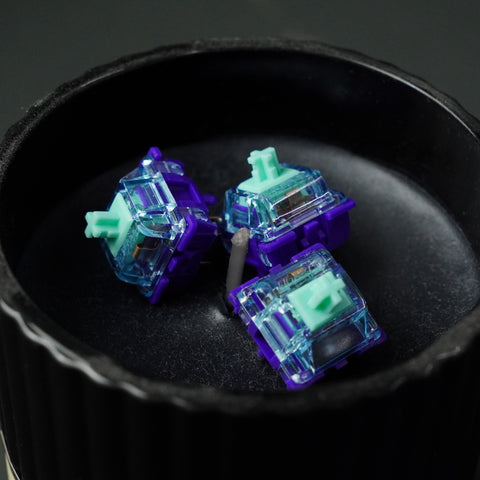Introduction
In the world of mechanical keyboards, your choice of switches can significantly impact your coding experience. For a programmer, a keyboard is more than just a tool—it’s an extension of your creativity and productivity. Choosing the right mechanical switch for your preferences and work environment can make all the difference. In this guide, we’ll discuss the different types of switches, their advantages, disadvantages, and considerations for different work environments.
Linear switches
Linear switches, such as the renowned Cherry MX Red, provide a smooth and consistent keystroke without a tactile bump or audible click. They are ideal for programmers who prefer a clean and quiet typing experience, making them a popular choice for gamers, writers, and programmers.
Advantages:
- Smooth keystrokes
- No noticeable click
- Relatively quiet operation.
Defects:
- There is no feedback when a click has been registered, which may result in lower precision and reduced typing speed.
Recommended switches:
Tactile switches
Tactile switches, such as the popular Cherry MX Brown, offer a noticeable deflection when pressing the keys, providing the user with feedback when the key is registered. This tactile feedback can increase both typing accuracy and typing speed, which is often preferred by heavy typists.
Advantages:
- A noticeable change in resistance informing that the key has been registered
Defects:
- Some tactile switches have a very pronounced click, which may be distracting for some users.
Clicky switches
Clicky switches, as exemplified by the famous Cherry MX Blue, feature a distinct change in resistance, like a tacitle switch, and an audible clicking sound when pressing the keys. While these are some of the most satisfying switches to type on, they may not be the best choice for office work, gaming, or typing at night due to their fairly loud sound.
Advantages:
- A noticeable change in resistance and a click informing that a click has been registered
Defects:
- Definitely the loudest among other types of switches, which makes them not the best choice for people working in an office.
Recommended switches:
- KTT Purple Click
- Cherry MX Blue
Working environment and switch selection
Open office spaces: In this case, it's best to avoid "clicky" switches that can be distracting to other people in the office.
Home Offices: Here we have complete freedom. If our home office is fairly isolated from the rest of the house or apartment, even loud clicky switches won't be a problem.
Summary
Choosing the right mechanical switch is a personal decision that depends on your preferences and work environment. Experiment with different switch types, consider the noise factor, and understand your typing habits to find the perfect fit for your coding efforts. Remember, the perfect switch is one that makes coding fun and efficient!



